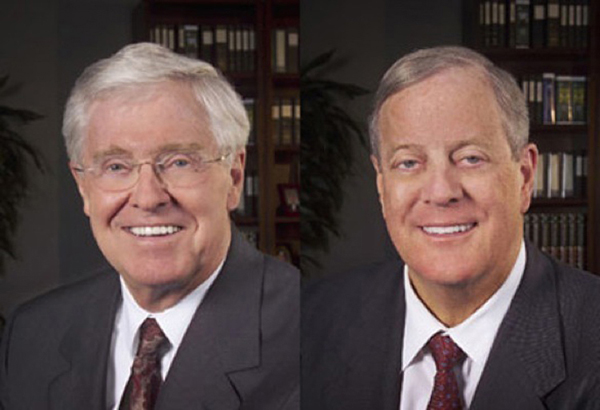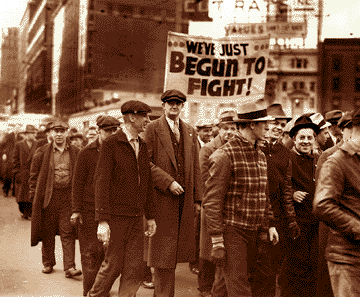Kochs Behind Wisconsin Union-Busting Effort
Submitted by Anne Landman on
 Rick Ungar of Forbes.com draws a direct line from the Koch Brothers to the effort to kill public unions in Wisconsin. The Center for Media and Democracy, Mother Jones and other news outlets have already reported that much of Wisconsin Governor Scott Walker's campaign financing came from the Koch Brothers. After successfully getting Walker elected, the plan to kill unions is next on the Kochs' To Do list. Koch-funded groups like Americans for Prosperity, the Reason Foundation and Competitive Enterprise Institute have all been openly hostile toward public sector unions. For those who still doubt that what is happening in Wisconsin is part of a coordinated, national attack on unions, on February 18, the executive director of the Wisconsin Public Workers Union sent a message to Governor Walker's office saying the union agreed to the cuts in pensions and benefits Walker seeks in his "budget repair" bill. The governor's response? No, not good enough. He is still holding out for nothing less than an end to collective bargaining rights for public unions. Why are the Koch brothers so keen on Wisconsin? They have major business interests in the state, including a coal company, six paper-related plants and a large pipeline network. Even worse for Wisconsin citizens, the Kochs have been laying off workers from their Wisconsin-based businesses even while deriving an extra $11 billion in income from their company, Koch Industries.
Rick Ungar of Forbes.com draws a direct line from the Koch Brothers to the effort to kill public unions in Wisconsin. The Center for Media and Democracy, Mother Jones and other news outlets have already reported that much of Wisconsin Governor Scott Walker's campaign financing came from the Koch Brothers. After successfully getting Walker elected, the plan to kill unions is next on the Kochs' To Do list. Koch-funded groups like Americans for Prosperity, the Reason Foundation and Competitive Enterprise Institute have all been openly hostile toward public sector unions. For those who still doubt that what is happening in Wisconsin is part of a coordinated, national attack on unions, on February 18, the executive director of the Wisconsin Public Workers Union sent a message to Governor Walker's office saying the union agreed to the cuts in pensions and benefits Walker seeks in his "budget repair" bill. The governor's response? No, not good enough. He is still holding out for nothing less than an end to collective bargaining rights for public unions. Why are the Koch brothers so keen on Wisconsin? They have major business interests in the state, including a coal company, six paper-related plants and a large pipeline network. Even worse for Wisconsin citizens, the Kochs have been laying off workers from their Wisconsin-based businesses even while deriving an extra $11 billion in income from their company, Koch Industries.

 It is both ironic and symbolic that Wisconsin's governor is the most visible one leading the way to dismantle workers' rights in the U.S. Wisconsin has been a pioneer in achieving workers's right in America, making Governor
It is both ironic and symbolic that Wisconsin's governor is the most visible one leading the way to dismantle workers' rights in the U.S. Wisconsin has been a pioneer in achieving workers's right in America, making Governor